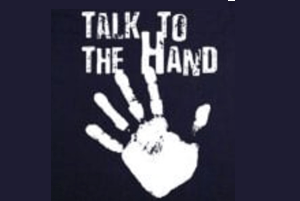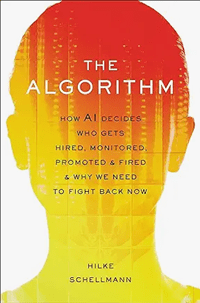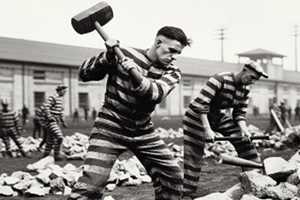Question
I’ve been told once again that to be considered for a real job interview I have to first do a solo AI job interview via video with a robot called HireVue. I’m really fed up having to invest my time with nothing invested by the employer! They don’t even give you your results. Just a rejection colder than those little postcards HR used to send out! (Remember those? I’ve been around a while.) After the robot “interviews” you, they use software algorithms to “watch” your video and more algorithms to score your facial expressions and voice. Am I just unschooled in AI or is this a racket?
Nick’s Reply
I’ve been writing about the likes of HireVue and other vendors of AI job interview robots since they came on the scene. I predicted they’d die a quick death. I was wrong.
 Today these highly questionable — but apparently profitable — HR technology systems proliferate. They purport to interview and assess job applicants, search social media to measure employee loyalty, and score people’s personality — all without ever meeting anyone. Among these companies: HireVue, IBM, Humantic AI, Fama, Arctic Shores, Good Egg, Ferretly, Intelligo, Predictim and many more. They are taking over HR.
Today these highly questionable — but apparently profitable — HR technology systems proliferate. They purport to interview and assess job applicants, search social media to measure employee loyalty, and score people’s personality — all without ever meeting anyone. Among these companies: HireVue, IBM, Humantic AI, Fama, Arctic Shores, Good Egg, Ferretly, Intelligo, Predictim and many more. They are taking over HR.
Does anybody know how the AI job interview works?
These vendors have supplanted real job interviews and legitimate assessments of job applicants and employees, substituting AI and extreme automation. They have infected Human Resources departments everywhere.
Critical review of this phenomenon has been sporadic and scattered, and HR’s role in the pain you suffer when job hunting has been sketchy.
If you’re a regular in this community, you know I very rarely recommend books about job hunting and hiring. So I’ll get to my advice: Read Hilke Schellmann’s new book. Before you consent to one more job interview by a robot, before you sit and video-record yourself “talking to the hand” while unaccountable algorithms “assess you,” get this book and take notes while you read it:
The Algorithm: How AI decides who gets hired, monitored,
promoted and fired and why we need to fight back now
Schellmann reveals what’s going on, and you’d better strap on a rubber apron because it’s gonna get messy.
HireVue and HR’s other AI fantasies exposed
Hilke Schellmann, an award-winning investigative reporter and journalism professor at NYU, has delivered a stunning survey of what’s wrong with using AI to judge people. Somebody’s responsible for this growing blob of inscrutable fake intelligence, and we must follow the money. The purchase orders originate in Human Resources — they own it.
In The Algorithm Schellmann skins HR alive, revealing the flaccid underbelly of AI-based HR technology in what seems to be the biggest rip-off ever of job seekers, employees and employers alike.
Rather than hold forth myself on the evils AI is visiting on your career, I’m going to show you what Schellmann has discovered and revealed about a phony technology propped up by PR, marketing and double-talk.
It’s HEEERE!
If you believe AI is still a relatively small component of hiring, consider that HireVue alone announced that by the end of 2022 its software had conducted 33 million “one way” job interviews. Schellmann reports that over 60 Fortune 100 companies use HireVue to conduct AI job interviews. One employer used HireVue to interview 50,000 applicants over just one weekend for 1,500 locations.
What this tells us is there is no Human in HR anymore. It’s called “Artificial” Intelligence for a reason — it’s Fake Intelligence. The only humans involved are job seekers suckered into “talking to the hand.” I read one account after another in this book about how these vendors misrepresent — or, if we want to be generous, misunderstand — the science behind their products. I believe any job hunter could save thousands of dollars and untold amounts of time and anguish in their job search by understanding that algorithms cannot judge your personality, analyze your facial expressions, fathom your character from how you move your head or predict from your voice whether you’d be good at a job.
Digging deep into the artificial HR
There’s nothing human about HR anymore. The profession has metamorphosed into a piggy bank for AI start-ups. To get to the bottom of it all, Schellmann played job seeker and used these AI tools herself, then cornered their developers with tough questions.
She interviewed at length the entrepreneurs behind the vendors. She consulted with psychologists, computer scientists and attorneys who evaluated the legitimacy of the “science” behind the tests, games and robots involved. She spoke with hiring managers and studied the experiences of job seekers who were subjected to AI assessments.
I’ve been waiting for Schellman to come along for a long time.
No single article can begin to portray the breadth of Schellmann’s findings, so I won’t try. I’ll give you some examples and I’ll hope you read her book.
Microseconds of deep thinking, or gas? Or a load of crap?
In its video AI job interviews, HireVue uses “facial expression analysis” to identify and measure emotions. Emotions are then scored and those scores are used to judge your “thinking style” and predict whether or not you would do a job well. Schellmann suggests compellingly that none of this has been shown to predict how well you’d do a job.
While discussing the “results” of a video interview, HireVue executive Nathan Mondragon tells Schellmann: “Your eye went like this and down and you went ‘umm.’ So two seconds of video capture, two seconds of data, but every microsecond of the video frame is frozen and your eye movement went down and your head tilted and you went into an alternative thinking style. A lot of times ‘eye going down’ means a deeper thinking style, and going up can be a creativity thinking style.” (p. 107)
After reviewing the facial recognition metrics and discussing the “science” of personality that HireVue’s algorithms rely on, an independent psychologist points out that “The face is not a window into the mind.” HireVue claims its algorithms determine your thinking style, but the psychologist points out that “thinking styles” are not supported by sound science. “We just don’t know what the meaning is of someone looking up or down… the movements don’t have inherent meaning… People scowl when they’re angry… when the are really focused, when they have gas.” (p. 113)
The theory behind their technology is “hugely problematic”
Much of the basis for the facial analysis algorithms rests on the (questionable, it turns out) assumption that if your best current employees display certain expressions during HireVue’s testing, then job applicants with the same expressions will be successful hires.
But Schellmann’s experts explain that to use facial expressions to identify emotions you must assume that ”emotions are indicated by roughly the same facial expressions that almost every human can recognize, and therefore computers could detect too.” (p. 112)
But bias creeps into the selection of “best employees” who represent the baseline.
“It could be that facial expressions… are just as random as hair color. If you look at high performers in video interviews and most people have brown hair, an unsupervised algorithm could pick up on that and choose only people with brown hair.”
Furthermore, the theory of universal emotions the technology is based on is outdated. “That’s what they’ve built their whole science around and it’s hugely problematic.”
We can’t check whether candidates can do the job!
This bit really warmed my heart because it proves effective marketing distracts us from crappy products.
Schellmann gets this little gem from Lindsey Zuloaga, the chief data scientist at HireVue: “What’s interesting with any job interview — if it’s scored by humans or by AI – is that a candidate only talks about their experiences. We are not seeing the candidate in action at their jobs. There is just a limitation of how do you know if someone’s going to do well at a job. The best way to know would be to let them do the job for a while and see how they do.” [Emphasis added.]
Duh, right? Now wait for it, because here it comes… “And obviously, you can’t do that,” said Zuloaga. “So assessing people is, in nature, kind of a proxy to getting to the actual job and the performance in the job.” (p. 101)
I can see this guy asking the seller of a used car to fill out a checklist about how well the car works but sees no reason to take it for a test drive. Zuloaga is so lost in his data that he has no concept of how people actually work “in nature”… by actually showing they can do the job! Better to use a proxy!
Skinning HR alive
These selected quotes are straight out of the book and speak for themselves. Memo to CEOs and boards of directors: Is this where your HR operation is spending your money?
1.
“The problem exists when the data that underlies some of this is filled with errors or the design of the algorithms is filled with errors,” [said assessment tools expert John Scott] about Humantic AI’s and Crystal’s software. “It’s this going after the latest technologies that has resulted in a commercialization of these assessment tools that exist at the expense of sound, professional practice and good science.” (pp. 48-49)
2.
[AI vendor] Crystal acknowledged that there are no independent studies verifying that its method works. (p. 48)
3.
When we ran Humantic’s AI [which analyzes social media postings] separately over participants’ Twitter and LinkedIn profiles, the software returned different personality predictions for many of the people in our study. (p. 49)
4.
[Harvard business professor] Joe Fuller’s report calls it ironic that company leaders keep complaining about not having enough qualified candidates for jobs, when they know that their own hiring processes are broken and actively excluding the very applicants they claim to so desperately want: “Employers almost universally acknowledge that these negative filters cause them to inadvertently exclude qualified candidates some, if not most of the time.” (p. 25)
5.
There is a company that predicts personality traits based on users’ social media feeds — with or without users’ consent…. Humantic AI advertised that with just an email address the company’s algorithm can scan social feeds of job candidates and give hiring managers hidden insights into job candidates: “Get to know their real persona, not just the persona they want you to see. Let DeepSense predict their culture fit, personality and behavior for you.” (p. 30)
6.
One job seeker whose uses the pronoun they… was able to see the report [compiled by Fama]. It contained more than three hundred pages analyzing all their tweets, retweets and likes. They were not amused by what they saw. (p. 36)
7.
I spoke to a lot of hiring managers. Most pointed to one main problem they were hoping AI would solve: they are overwhelmed by the number of job applications they receive. AI promises a quick fix. One hiring manager, who started using an AI-based resume screener… told me that his people are not checking whether the algorithm works, since artificial intelligence never makes mistakes. (p. 46)
[Uh, if the company stopped soliciting so many applications via fire hose, its managers would have time to screen the resumes? Now we’ll close with the most embarrassing quote in the book. –Nick
 8.
8.
Safe Hammad, the chief technology officer, and cofounder of game-based assessment provider Arctic Shores said… “For me, it’s magic. I understand the science a little bit underneath. I certainly understand the mathematics, but it’s like magic.” p. 56)
These quotes barely scratch the surface of Schellmann’s findings and analysis. There’s so much more, and I so admire both the depth and breadth of her research. Some of her interviews with AI firm managers made me crack up — they seem as clueless about being exposed as they are about the missing scientific underpinnings of their slap-dash “products.”
My hat is off to Hilke Schellman. A fine job of delivering a valuable public service!
Join the book club!
I’m not even done reading the book. I spent as much time writing in the margins and highlighting as I’ve spent reading! This is a remarkable book. A downright scary analysis, expose and general all-around skinning of HR — the good folks that fund these AI companies and make you talk to a screen. (I haven’t even brought up the parts of the book about withholding the files these firms create about you…)
What do you think? Is it like magic? Are you already aware of the scope of AI (FI?) being inflicted on job seekers, employees, employers, managers and, well, the entire economy? How much of “the jobs numbers” do these AI dealers and their HR junkies affect? Have you been subjected to the magic? Is Hilke Schellmann serious? Do “we need to fight back now?” How?
Let’s start a book club. Get the book (from your library or buy it so you can mark it up!), post your comments, questions, analysis and, uh, intelligent banter. That’s what we’re here for. (This website earns a small commission from Amazon on books you buy from links you find here. I use the funds to pay for the servers and maintenance. Thanks for your support.)
: :
 You have two choices: bring this to a head, or let it alone. My advice is to let it alone. Let’s explore the other option, then I’ll explain why I think you should leave it alone
You have two choices: bring this to a head, or let it alone. My advice is to let it alone. Let’s explore the other option, then I’ll explain why I think you should leave it alone



 If the manager talked a blue streak during your interview, I think the manager should let someone else do the interviewing.
If the manager talked a blue streak during your interview, I think the manager should let someone else do the interviewing.
 Today these highly questionable — but apparently profitable — HR technology systems proliferate. They purport to interview and assess job applicants, search social media to measure employee loyalty, and score people’s personality — all without ever meeting anyone. Among these companies: HireVue, IBM, Humantic AI, Fama, Arctic Shores, Good Egg, Ferretly, Intelligo, Predictim and many more. They are taking over HR.
Today these highly questionable — but apparently profitable — HR technology systems proliferate. They purport to interview and assess job applicants, search social media to measure employee loyalty, and score people’s personality — all without ever meeting anyone. Among these companies: HireVue, IBM, Humantic AI, Fama, Arctic Shores, Good Egg, Ferretly, Intelligo, Predictim and many more. They are taking over HR.

 Make time!
Make time!